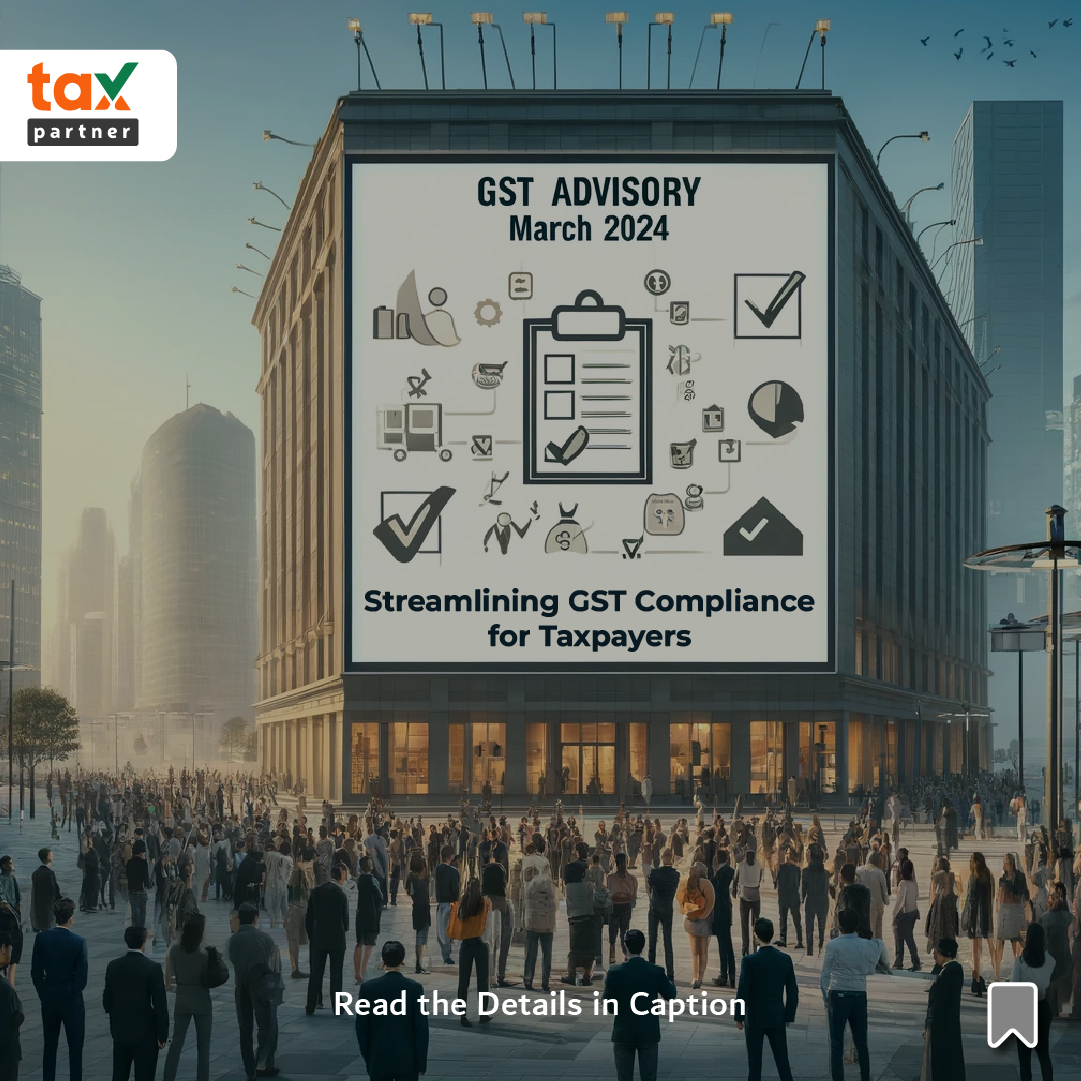GSTN Advisory March 2024
GSTN Advisory March 2024: Streamlining GST Compliance for Taxpayers
Author- Tanvi Thapliyal
In India, businesses must stay up to date on regulatory changes and compliance requirements in order to stay ahead of the complicated web of goods and services taxes. The Goods and Services Tax Network (GSTN), which is the brains of GST management in the country, is at the forefront of making this important part of paying taxes easier. As the central hub for all things related to GST, GSTN is very important for making tax processes more efficient and making sure that rules are followed. Distributing timely advisories is one of its main jobs. These serve as compass points for taxpayers managing the complicated world of GST compliance. These guidelines not only explain changes to regulations, but they also give advice on how to make compliance more effective. In this article, we look at the most recent advisories that GSTN put out in March 2024 and explain how they help businesses all over India comply with GST more easily.
March 2024 GSTN Advisory
In March 2024, GSTN, which is the main platform for GST-related operations, issued a set of advisories to strengthen the GST compliance landscape. These advisories were designed to address important areas that are crucial for ensuring smooth compliance with tax regulations, taking into account the changing needs of taxpayers throughout India. The key highlights covered in these advisories include information on registration delays, improvements in the E-way bill system, and updates related to GSTR-1/IFF reporting. The purpose of each advisory was to provide taxpayers with the necessary information and tools to successfully deal with the complexities of GST compliance. The advisories from GSTN covered a range of important topics, showing their dedication to making tax operations easier and improving compliance standards across the country.
Advisory On Delay In GST Registration
The advisory discussed a relevant issue that taxpayers are facing, specifically situations where there are delays in GST registration even after successful Aadhar Authentication. The Aadhar Authentication is an important step in the registration process, but some taxpayers have experienced delays in getting their registration approved.
-
The advisory provided instructions on how to handle this situation, specifically referring to Rule 8 and 9 of the CGST Rules, 2017.
-
These rules require that processing be completed within 30 days after Aadhar verification.
-
However, if a taxpayer goes through Aadhar authentication but is selected for detailed verification based on their risk profile (as per Rule 9(aa)), their application should still be processed within 30 days of submission.
Moreover, the advisory gave reassurance that applications undergoing detailed verification would be processed in a timely manner. They want to make sure that they process everything on time, so they'll be making some changes. These changes will also be reflected in the online tracking module. GSTN is committed to making the registration process easier and reducing delays for taxpayers. This shows their dedication to helping people comply with GST regulations more smoothly.
Introduction Of Four New IRP (Invoice Registration Portal) Portals
The GSTN has recently issued an advisory regarding the integration of E-Way bill services with four new IRP (Invoice Registration Portal) portals through NIC (National Informatics Centre). This is a noteworthy development in the GST landscape. This integration allows taxpayers to generate E-Way bills in addition to E-Invoicing, making compliance processes more streamlined and accessible.
You can now generate E-Way bills on the following four IRP portals with this integration:
-
-
-
-
-
These portals are designed to enhance the services already offered on the NIC-IRP portal.
-
They give taxpayers additional choices for generating E-Way bills along with E-Invoicing.
-
GSTN aims to make it easier for taxpayers to comply with GST regulations by integrating E-Way bill services with these IRP portals.
-
This will enhance convenience and accessibility for taxpayers, making the process smoother.
-
This move shows that GSTN is dedicated to constantly improving its services and helping taxpayers navigate the complexities of GST compliance.
Introduction Of New Tables 14A And 15AIn GSTR-1 / IFF (Invoice Furnishing Facility)
These tables are meant to capture the amendment details of supplies made through e-commerce operators (ECOs). These tables are very important because-
-
They help improve the reporting system for e-commerce transactions and make sure that businesses follow GST regulations.
-
Starting in February 2024, suppliers and e-commerce operators can now make changes to the information they previously reported using Tables 14A and 15A.
-
Table 14A is a section in GSTR-1 that deals with amended supplies made through e-commerce operators.
-
It allows suppliers to correct information about supplies where e-commerce operators are responsible for collecting tax under section 52 or paying tax under section 9(5) of the CGST Act, 2017.
-
Table 15A is also helpful for making changes to supplies under section 9(5) in both GSTR-1 and IFF.
-
The purpose of this table is to allow e-commerce operators to make changes to the information of the original supplies that were reported in previous return periods. It is designed to accommodate different situations, such as supplies made to registered recipients (B2B) or unregistered recipients (B2C), among others.
-
These amendments directly affect Form GSTR-2B. A new table called "ECO - Documents (Amendment)" has been included.
-
The table provides registered recipients with the ability to see the revised document details of supplies made by e-commerce operators.
-
This is especially important for supplies on which e-commerce operators are responsible for paying taxes under section 9(5) of the CGST Act.
These new tables and amendments show that GSTN is dedicated to improving the ways people follow the rules and making sure that e-commerce transactions are reported correctly. The addition of these features shows that GSTN is listening to the changing needs of taxpayers and is committed to making GST compliance processes easier.
Implications Of the Advisory
The advisories that were issued by GSTN in March 2024 have important implications for taxpayers and GST compliance. They offer various benefits that are designed to make reporting processes more efficient and improve compliance.
-
First of all, it is important to note that the advisory regarding delays in GST registration plays a crucial role in making sure that registration applications are processed on time. When taxpayers have a clear understanding of the processing guidelines outlined in Rule 8 and 9 of the CGST Rules, 2017, they can anticipate faster processing, even in situations that require thorough verification. By assuring timely processing, we can address any worries about registration delays and make it easier for you to get started on the GST platform.
-
The E-way bill services are now integrated with the new IRP portals via NIC. This means that users have more access to generate E-Way bills along with E-Invoicing. This integration makes things easier for taxpayers and also adds convenience by offering multiple ways to generate E-Way bills. These services complement each other and show that GSTN is dedicated to offering complete solutions for compliance-related tasks. This ultimately helps reduce the workload for taxpayers and promotes a business-friendly environment.
-
The inclusion of new Tables 14A and 15A in GSTR-1 / IFF is a big improvement in how e-commerce transactions are reported. Suppliers and e-commerce operators are given the ability to make changes to supply details, which allows taxpayers to correct any mistakes or missing information in their previous filings. Ensuring accurate reporting not only helps with transparency but also ensures compliance with GST regulations.
These advisories are very important because they help make it easier for taxpayers to report and follow the rules. GSTN is constantly working on addressing important issues and making improvements to the GST ecosystem. This helps taxpayers to easily and efficiently fulfil their compliance obligations.
Importance Of These Advisories
The March 2024 advisories from GSTN include important information about timely processing of GST registrations, integrating E-Way bill services with new IRP portals, and introducing new reporting tables in GSTR-1 / IFF for e-commerce transactions.
-
It is important to stay updated with these advisories in order to ensure that you are complying with GST regulations smoothly. They offer valuable advice and assistance in understanding the intricate details of GST regulations, which can help taxpayers avoid penalties and simplify their compliance procedures.
-
It is recommended that taxpayers make use of the resources offered by GSTN, such as timely advisories and guidance, to improve their compliance efforts. To effectively meet their compliance obligations and contribute to a more efficient GST ecosystem, taxpayers can stay informed and proactive.
-
These advisories ultimately help taxpayers feel more confident and efficient when navigating the changing landscape of GST compliance. To minimise errors, maximise compliance, and focus on their core business activities, taxpayers can follow the guidelines outlined in the advisories.
Conclusion
Overall, the advisories issued by GSTN in March 2024 are extremely important as they help taxpayers navigate the complexities of GST compliance. These advisories offer valuable insights and support to taxpayers by addressing important issues such as registration delays, enhancements to the E-way bill system, and updates in GSTR-1/IFF reporting. It's really important to stay updated with these advisories so that you can comply with GST regulations smoothly and avoid any penalties. You should take advantage of the resources provided by GSTN to improve your compliance efforts and help create a more efficient GST ecosystem.
If taxpayers need expert guidance and assistance with GST compliance, they can trust TaxPartner to offer customised solutions and ensure they meet all regulatory standards smoothly. Overall, these advisories give taxpayers the ability to confidently and efficiently comply with GST regulations, with the support of TaxPartner's expertise.
FAQ’S
What is the importance of the GSTN advisories that were released in March 2024?
The GSTN advisories are designed to help taxpayers with timely guidance on different aspects of GST compliance. They aim to assist taxpayers in effectively navigating through the regulatory requirements.
How does GSTN contribute to issuing these advisories?
Yes, GSTN is the common portal for GST. It is responsible for issuing advisories to help taxpayers comply with GST regulations.
What are the main topics discussed in the advisories for March 2024?
The advisories provide information on various topics, including registration delays, improvements in the E-way bill system, and updates in GSTR-1/IFF reporting.
How does GSTN handle delays in GST registration even after successful Aadhar Authentication?
Yes, GSTN makes sure that applications are processed on time according to Rule 8 and 9 of CGST Rules, 2017, even after successful Aadhar Authentication.
Can you please provide me with the processing guidelines mentioned in Rule 8 and 9 of the CGST Rules, 2017?
Rule 8 and 9 state that GST registration applications should be processed within 30 days after Aadhaar verification.
How do taxpayers benefit from the integration of E-Way bill services with the new IRP portals via NIC?
Taxpayers now have the option to generate E-Way bills and E-Invoicing on multiple platforms, making it more convenient and accessible for them.
What is the significance of the new Tables 14A and 15A that have been introduced in GSTR-1/IFF reporting?
These tables are used to capture amendment details of supplies made through e-commerce operators. They help ensure accurate reporting of such transactions.
When did Tables 14A and 15A become relevant for reporting in GSTR-1/IFF?
These tables became relevant starting from the February 2024 tax period.
How will registered recipients benefit from the addition of a new table called "ECO - Documents (Amendment)" in Form GSTR-2B?
Registered recipients have the ability to view amended document details of supplies made through e-commerce operators. This helps to improve transparency and accuracy in reporting.
What impact can these advisories have on taxpayers' compliance efforts?
These advisories are designed to make reporting and compliance procedures easier for taxpayers, which helps reduce the chances of making mistakes and facing penalties.
How can I, as a taxpayer, stay updated with the latest GSTN advisories?
To stay informed, taxpayers can regularly check the GSTN portal or subscribe to updates through email or SMS.
What kind of help does TaxPartner offer to taxpayers dealing with GST compliance issues?
TaxPartner provides expert advice, streamlined compliance solutions, valuable strategic insights, and enhanced tax efficiency to assist taxpayers in meeting GST regulations.
How can I avail of TaxPartner's services as a taxpayer?
You can contact TaxPartner directly or visit their website to explore their range of services and schedule a consultation.
Are TaxPartner's services limited to specific industries or sectors?
No, TaxPartner serves a variety of industries and sectors and provides tailored solutions to meet the specific requirements of each client.



